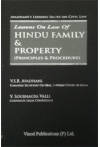- Author(s): V.S.R. Avadhani, V. Soubhagya Valli
- Publisher: Vinod Publications (P) Ltd.
- Edition: Ed 2019
- ISBN 13 9788194006237
- Approx. Pages 684 + Contents
- Format Hardbound
- Approx. Product Size 24 x 16 cms
- Delivery Time 3-5 working days (within Kerala & South India) (Others 7-9 days)
- Shipping Charge Extra (see Shopping Cart)
......................................................................................................................................
Description
The practice of law is the pursuit of truth and justice in interpersonal relationships. Any religious society by scripting its own rules to regulate the behavior of its members will endeavor to preserve and ensure the moral values of the society at large. Mahatma Gandhi considered religion as the foundation of the life of a human being To him a life without religion was a life without principle: because he felt principle was necessary to guide human conduct, he thought a life without religion would tack focus Ahuman being is a composite personality expressing physical, vital, mental and spiritual dimensions of life. The synchronization of these aspects of life is the primary domain of dharma One's duty to one's family group, soclet humanity and to God are all part of dharma. A fundamental feature of the Hindu tradition is absence of dividing line between the sacred and the secular. No contradiction is perceived between temporal ends and the eternal goal. There is no area of life, according which is unfamiliar to spiritual influence. In a Hindu society, religious precepts and moral codes of conduct are an important force to offset the individual's propensity to pursue ones' own egocentricity and personal glorification These principles and teachings are codified in the Dharma Sastras of Law Books. Laws in a Hindu society are enforced with diligence and sensibility in order to ensure justice and fair play for all. The primary rights of life and property of law-abiding citizens are protected Law is invoked where there is a transgression of rights.
......................................................................................................................................
Table of Contents
Chapter 1 : General Principle of Hindu Law
Chapter 2 : HUF & Tax Implication
Chapter 3 : Minors in Joint Hindu Family
Chapter 4 : Sales of Property Pending Suit
Chapter 5 : Coparcenar
Chapter 6 : Hindu Women & Property
Chapter 7 : Hindu Joint Family & Partotion
Chapter 8 : Hindu Women & Maintenance, Personal & General Law
Chapter 9 : Rule of Succession Under Hindu Succession Act, 1956
Chapter 10 : Partition Suit & Decree Procedure
......................................................................................................................................
Author Details
V.S.R.Avadhani, Formerly Secretary General, Supreme Court of India, Former Member (Judicial),
National Company Law Tribunal Advocate and Legal Consultant
V.Soubhagya Valli, Corporate Legal Consultant

